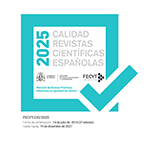Submissions
Submission Preparation Checklist
As part of the submission process, authors are required to check off their submission's compliance with all of the following items, and submissions may be returned to authors that do not adhere to these guidelines.-
Submitting an article to this journal implies the acceptance of the Declaration of Originality and Authorship.
Download file - The submission file is in OpenOffice or Microsoft Word.
- Where available, URLs for the references have been provided.
- Where available, DOIs have been included.
- The text adheres to the stylistic and bibliographic requirements outlines in the Author Guidelines, which is found in ‘About the Journal’
- If submitting to a peer-reviewed section of the journal, the instructions in ‘Ensuring a Blind Review’ have been followed
Copyright Notice
In order to support the global exchange of knowledge, the journal Complutense Journal of English Studies is allowing unrestricted access to its content as from its publication in this electronic edition, and as such it is an open-access journal. The originals published in this journal are the property of the Complutense University of Madrid and any reproduction thereof in full or in part must cite the source. All content is distributed under a Creative Commons Attribution 4.0 use and distribution licence (CC BY 4.0). This circumstance must be expressly stated in these terms where necessary. You can view the summary and the complete legal text of the licence.
Privacy Statement
Basic information on treatment data protection: Publications Service
| Controller | Vicerrectorado Cultura y Deporte y Extensión Universitaria, +info |
| Purpose | Dissemination and sale of UCM’s publishing/ billing and shipping of publications +info |
| Legitimacy | Mission in public interest; execution of a contract +info |
| Recipients | No data will be transferred to third parties, except legal obligation +info |
| Rights | Access, rectify and erasure data, as well as other rights, explained in the additional information +info |
| Additional information | You can find more detailed information on our website: https://www.ucm.es/file/info- |








